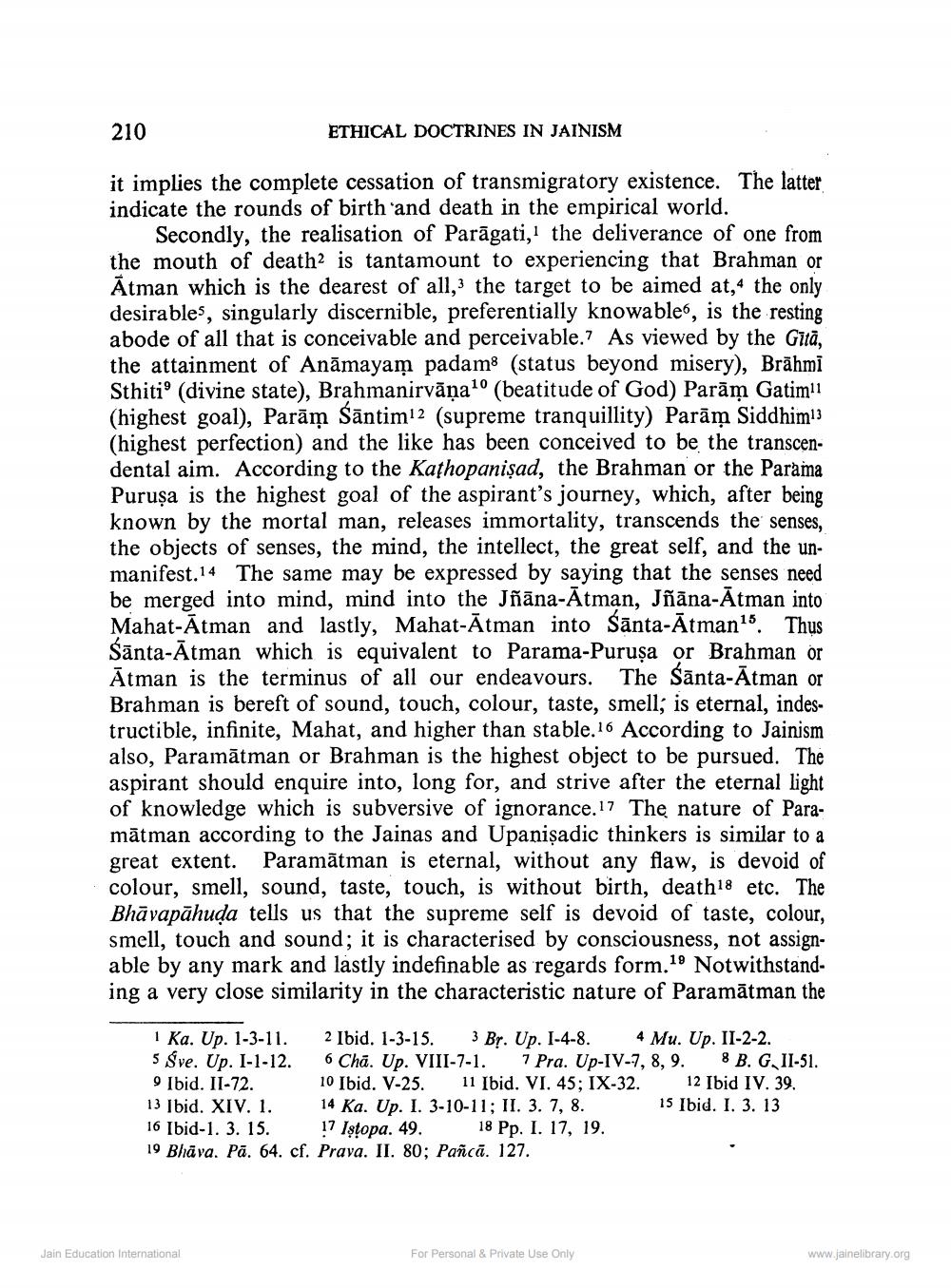________________
210
ETHICAL DOCTRINES IN JAINISM
it implies the complete cessation of transmigratory existence. The latter indicate the rounds of birth and death in the empirical world.
Secondly, the realisation of Parāgati, the deliverance of one from the mouth of death2 is tantamount to experiencing that Brahman or Ātman which is the dearest of all, the target to be aimed at, the only desirables, singularly discernible, preferentially knowable, is the resting abode of all that is conceivable and perceivable. As viewed by the Gitā, the attainment of Anāmayam padam8 (status beyond misery), Brāhmi Sthitio (divine state), Brahmanirvāṇało (beatitude of God) Parām Gatimi (highest goal), Parām Sāntim12 (supreme tranquillity) Parām Siddhim13 (highest perfection) and the like has been conceived to be the transcendental aim. According to the Kathopanişad, the Brahman or the Parama Puruşa is the highest goal of the aspirant's journey, which, after being known by the mortal man, releases immortality, transcends the senses, the objects of senses, the mind, the intellect, the great self, and the unmanifest.14 The same may be expressed by saying that the senses need be merged into mind, mind into the Jñāna-Ātman, Jñāna-Ātman into Mahat-Ātman and lastly, Mahat-Ātman into Sānta-Ātman 15. Thus Sānta-Ātman which is equivalent to Parama-Purusa or Brahman or Ātman is the terminus of all our endeavours. The Sānta-Ātman or Brahman is bereft of sound, touch, colour, taste, smell, is eternal, indestructible, infinite, Mahat, and higher than stable. 16 According to Jainism also, Paramātman or Brahman is the highest object to be pursued. The aspirant should enquire into, long for, and strive after the eternal light of knowledge which is subversive of ignorance.17 The nature of Paramātman according to the Jainas and Upanisadic thinkers is similar to a great extent. Paramātman is eternal, without any flaw, is devoid of colour, smell, sound, taste, touch, is without birth, death18 etc. The Bhāvapāhuda tells us that the supreme self is devoid of taste, colour, smell, touch and sound; it is characterised by consciousness, not assignable by any mark and lastly indefinable as regards form.19 Notwithstanding a very close similarity in the characteristic nature of Paramātman the
1 Ka. Up. 1-3-11. 2 Ibid. 1-3-15. 3 Br. Up. 1-4-8. 4 Mu. Up. II-2-2. 5 Sve. Up. l-1-12. 6 Chā. Up. VIII-7-1. 7 Pra. Up-IV-7, 8, 9. 8 B. G II-51. 9 Ibid. II-72. 10 Ibid. V-25. 11 Ibid. VI. 45; IX-32. 12 Ibid IV. 39. 13 Ibid. XIV. 1. 14 Ka. Up. I. 3-10-11; II. 3. 7, 8. 15 Ibid. I. 3. 13 16 Ibid-1. 3. 15. 17 Istopa. 49. 18 Pp. I. 17, 19. 19 Bhāva. Pā. 64. cf. Prava. II. 80; Pancā. 127.
Jain Education International
For Personal & Private Use Only
www.jainelibrary.org




